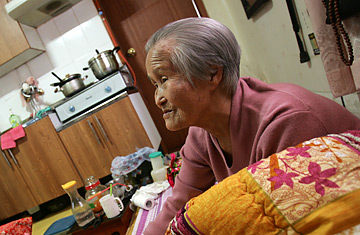
Kim Yang-Soon, aged 85, is a great-aunt of Cho Seung-Hui. She lives in Goyan, South Korea.
Like others in her family, Kim told TIME that she did not recognize Seung-Hui's face when it appeared on television. The last time they saw him, he was just a boy of eight in 1992 and heading off for a new and hopefully better life in America with his struggling family. The immigrant family hasn't returned to Korea during the intervening fifteen years, not even for the funeral of Seung-Hui's grandmother. However, they had made a point to phone on special holidays. According to Kim Hyang Sik, in one of these calls, just last New Year, her niece Kim Hyang Im — Seung-Hui's mother — confessed to her aunt and other relatives that her son had been diagnosed in the U.S. with autism. "The doctor told her that Seung-Hui was ill and she was very worried about him. She said her daughter was doing well, though."
Kim noticed that Seung-Hui was painfully shy as a youngster in South Korea, but she had reassured his mother that he would come out of his shell sooner or later. "I told her he was just shy and had a soft personality." However, she says that other relatives were less optimistic about his shortcomings and reportedly saw his aloofness as dysfunctional and a telltale sign of a looming mental problem.
Back then, the Cho family, struggled to eke out an existence on a small income from a second-hand bookshop and rented a bleak, two-room basement apartment in a Seoul neighborhood. Relatives already living in the U.S. invited the Chos to emigrate in 1984, but it took eight long years to obtain proper visas.
Now, nearly one week after the gruesome rampage, Kim and her relations remain very distraught over the ordeal, and at a loss to understand how Seung-Hui could have committed such an atrocity, bringing so much shame to his family. "In our family the children don't insult their parents," says Kim whose well-groomed family burial ground sits on a low rise at the back of her property and is visible from her front door. "I don't know how he could do this to his parents. I also feel terrible for the victim's families."
The plain-spoken octogenarian, who managed a motel until her late '70s, is relieved that rumors of suicide by Seung-Hui's parents proved false. All the same, she doesn't think it would be advisable for the family, who have maintained their Korean citizenship, to return to their native land in the wake of this horrible tragedy. "It would it would be too difficult for them if they returned here as this is a small country and Koreans are very gossipy," she says matter-of-factly. "We wouldn't let them return and would even try and block them if they tried."
While Kim's family has not been harassed since the tragedy, neighbors haven't exactly gone out of their way to console the shame-ridden family. "We didn't want them to know, but then they found out," she says. And with almost a sigh of relief, the diminutive Kim adds, "After killing so many people, it is good he committed suicide."
